|
|
|
Sort Order |
|
|
|
Items / Page
|
|
|
|
|
|
|
| Srl | Item |
| 1 |
ID:
103543
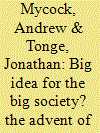

|
|
|
|
|
| Publication |
2011.
|
| Summary/Abstract |
The proposed introduction of National Citizen Service (NCS) by the Conservative party survived the negotiations with the Liberal Democrats and forms part of the coalition's policy agenda. The idea forms part of the concern of Cameronian Conservatives to create a big society, based primarily upon volunteering and civil engagement. Drawing upon comparisons with state and private sector-led models of citizen volunteering in Germany and the United States, this article explores the evolving rationale for the introduction of NCS and evaluates the issues and pitfalls which may arise.
|
|
|
|
|
|
|
|
|
|
|
|
|
|
|
|
| 2 |
ID:
103542
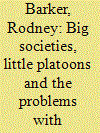

|
|
|
|
|
| Publication |
2011.
|
| Summary/Abstract |
Conservative talk of a 'big society' is one more mutation of the unstable family of pluralism. It is a large family, with both benign and progressive left wing members and rogue right wing black sheep. The progressive contribution has been substantial, but pluralism is not a homogeneous ideology or set of policies, and the single word conceals stresses and irreconcilable oppositions in theory and practice. An examination of this variety gives clues to the latest contributions, and to some of the more regressive uses to which pluralism can be put. The left needs both to insist on its own major contribution to progressive pluralism, and to beware of wolves in pluralist clothing.
|
|
|
|
|
|
|
|
|
|
|
|
|
|
|
|
| 3 |
ID:
103537
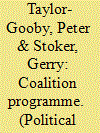

|
|
|
|
|
| Publication |
2011.
|
| Summary/Abstract |
The Coalition programme includes restructuring public provision through reforms and cuts which will take public spending in the Britain below that in the US. This article explores whether the Coalition agenda is best understood as a new approach to Britain's deep-seated economic short-comings or simply as the normal politics of gaining and retaining power. It analyses the current government's programme, identifies the common features across the range of policies and discusses how they are likely to develop as they encounter set-backs.
|
|
|
|
|
|
|
|
|
|
|
|
|
|
|
|
| 4 |
ID:
103538
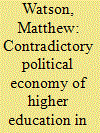

|
|
|
|
|
| Publication |
2011.
|
| Summary/Abstract |
The Coalition government's first Comprehensive Spending Review will cut 40% from university budgets by 2014. This will result in an increasingly tension-prone political economy of UK higher education. As it is, the sector already sits uncomfortably astride the two distinct welfare models currently in existence in Britain. As the fees agenda has taken hold, university degrees have been increasingly susceptible to being rebranded as a strategic investment in the future, thus acting as an exemplar for the move towards an asset-based system of welfare. Despite this, even in the post-Browne world students will still not be charged the full market price of delivering degree programmes. Higher education institutions therefore continue to be redistributive mechanisms providing long-term welfare-enhancing transfer payments to their overwhelmingly middle-class student base. The budget cuts and the associated changes to student finance will bring into stark relief the contradictions of serving two welfare masters at once.
|
|
|
|
|
|
|
|
|
|
|
|
|
|
|
|
| 5 |
ID:
103540
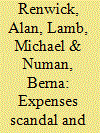

|
|
|
|
|
| Publication |
2011.
|
| Summary/Abstract |
The scandal over MPs' expenses that erupted in 2009 was followed by a surge in discussion of electoral reform. A range of reforms to Westminster's existing electoral system are now high on the political agenda. This article examines the extent and the nature of the scandal's impact on the electoral reform debate and draws out comparative implications for the sorts of conditions that can force politicians to accept electoral reforms that they do not want. It finds that the expenses scandal significantly changed debate about some electoral reform topics, but not about others. It proposes three factors likely to increase the impact of scandal in sparking reform: that the scandal is seen as harming ordinary people in their daily lives; that reforms can readily be understood as likely to mitigate the sources of scandal; and that those reforms do not seriously harm politicians' own perceived interests.
|
|
|
|
|
|
|
|
|
|
|
|
|
|
|
|
| 6 |
ID:
103545
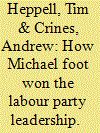

|
|
|
|
|
| Publication |
2011.
|
| Summary/Abstract |
This paper examines the voting motivations of Labour parliamentarians in the final parliamentary ballot of the Labour party leadership election of 1980. By constructing a data set of the voting behaviour of Labour parliamentarians and by determining the ideological disposition of the 1980 parliamentary Labour party (PLP) this paper examines the ideological disposition of the candidates' vis-à-vis their electorate, and offers a challenge to traditional interpretations of how and why Foot was elected. The traditional interpretation has sought for explanations as to how a right-wing dominated PLP elected a left-wing candidate. Whilst citing the traditional interpretations of the impact of the impending Electoral College, mandatory reselection and the assumed weaknesses of the Healey campaign, this paper argues that there was considerably more left-wing sentiment within the 1980 PLP in terms of economic management, defence and the Common Market, than previously considered. As such this paper suggests that, taken with the impact of the other factors, the victory of Foot should not be seen as that surprising.
|
|
|
|
|
|
|
|
|
|
|
|
|
|
|
|
| 7 |
ID:
103539


|
|
|
|
|
| Publication |
2011.
|
| Summary/Abstract |
Letter from North Haven is an essay on American national identity that shows the depth of small town mentalities in American life-no matter that that life is mainly urban and industrial. We move from Chicago School sociology to the Catcher in the Rye; from Bob Dylan to Steven Spielberg; from Jacksonian Democracy to the Tea Party movement. The essay ends by using the example of politics in North Haven, Maine, to call upon the President to revive his campaign by explaining America's problems in the plain style and tangible context of small town USA.
|
|
|
|
|
|
|
|
|
|
|
|
|
|
|
|
| 8 |
ID:
103541
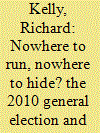

|
|
|
|
|
| Publication |
2011.
|
| Summary/Abstract |
The 2010 general election threw traditional arguments about electoral reform into chaos: defenders of the status quo suddenly found themselves defending outcomes the existing system is supposed to prevent, while advocates of reform were obliged to praise outcomes arising from current arrangements. This article examines the strengths and weaknesses of first-past-the-post in the light of the 2010 result and asserts that-contrary to many claims-FPTP remains a defensible electoral system. In doing so, the article highlights the peculiar political circumstances attending the last general election, while reminding readers that other recent UK elections, conducted under other electoral systems, have not been free of serious anomalies.
|
|
|
|
|
|
|
|
|
|
|
|
|
|
|
|
| 9 |
ID:
103544
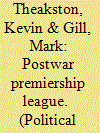

|
|
|
|
|
| Publication |
2011.
|
| Summary/Abstract |
The article reports the results from the latest survey of academic experts polled on the performance of post-1945 prime ministers. Academic specialists in British politics and history rate Clement Attlee as the best postwar prime minister, with Margaret Thatcher in second place just ahead of Tony Blair in third place. Gordon Brown's stint in Number 10 was the third-worst since the Second World War, according to the respondents to the survey that rated his premiership as less successful than that of John Major. The article compares public and academic opinion and rankings of prime ministers and their performance, noting significant discrepancies in contemporary and retrospective evaluations. Academic respondents to the survey also provided detailed ratings and evaluations of the performance and policy impact of the four prime ministers since 1979: Margaret Thatcher, John Major, Tony Blair and Gordon Brown.
|
|
|
|
|
|
|
|
|
|
|
|
|
|
|
|
| 10 |
ID:
103546


|
|
|
|
|
| Publication |
2011.
|
| Summary/Abstract |
Quangos (or more accurately, arm's length bodies) are the subject of repeated culls by incoming governments, yet individually are seen as useful devices to reassure the public and give confidence in the performance of public functions. We argue that the confused landscape and poor governance has contributed to the view that, as a class, ALBs are inefficient and unaccountable. The government needs to take the opportunity of its review to rationalise the complex landscape of ALBs, and put governance on a more robust long-term footing based on the degree of freedom an ALB needs to command public confidence.
|
|
|
|
|
|
|
|
|
|
|
|
|
|
|
|
| 11 |
ID:
103547
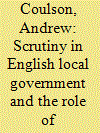

|
|
|
|
|
| Publication |
2011.
|
| Summary/Abstract |
Overview and Scrutiny Committees were introduced in England and Wales in the Local Government Act 2000 that ended the role the full council and its committees as the locus of decision-making for most local authorities. Overview and scrutiny committees composed of councillors not on small decision-making executives were tasked with holding these to account. The performance of scrutiny committees is variable. Generally they work best where they concentrate on reviews of policy and practice, with recommendations following from well-researched reports. The paper reviews the difficulties which arise when scrutiny committees endeavour to hold powerful executives to account, and suggests that to strengthen this new legislation is required, in particular to institutionalise scrutiny committees as agencies of the full council, the representative body for the area, comparable to the way in which the select committees at Westminster are the agencies of the Parliament.
|
|
|
|
|
|
|
|
|
|
|
|
|
|
|
|
|
|
|
|
|